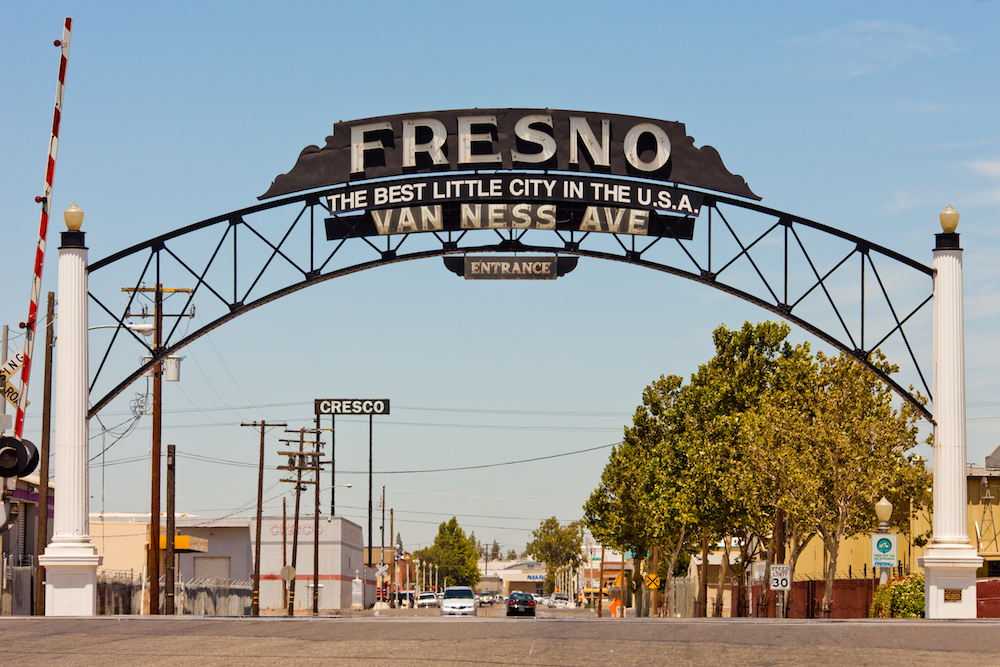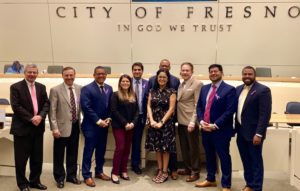
Fresno: The Best Little City in the U.S.A. Courtesy of Thomas Hawk/flickr.
Looking for the biggest wave in California? Go to Fresno.
It’s not just that fast-growing Fresno is emerging as the Golden State’s next great city. Fresno is also undergoing dramatic—and overdue—changes that are opening up its small-town political culture. At the heart of this transformation story is the so-called “Brown Wave,” the emergence of local elected officials, who, like half of Fresno’s residents, are Latino.
Today Fresno, the state’s geographic center, finds itself at its political center. In fact, the most important race in California’s March 3 elections probably won’t end up being the Democratic presidential primary (since the rules all but guarantee a split verdict among the leading contenders). Instead, the contest to be Fresno’s next mayor—a referendum of sorts on the progress of the “Brown Wave”—could be more crucial for what it portends for shifts in political power not just in Fresno, but in communities across the state.
This political wave represents an important—and, for some in Fresno, unsettling—reversal for a city that has long seen itself as more agricultural than urban. In Fresno, as in other agriculturally oriented places in California, rising Latino economic and political power promises a new narrative and a different future for places where white people traditionally held power while brown people did the hardest work.
The media adopted the inelegant term “Brown Wave” to describe the results of Fresno’s 2018 municipal elections, which unexpectedly produced a four-member Latino majority on the seven-member city council. Those four politicians—incumbents Esmeralda Soria and Luis Chavez, alongside council newcomers Miguel Arias, a former community college trustee, and Nelson Esparza, previously a county education board member—grew up in poor or working-class families in Fresno or other San Joaquin Valley communities.
Latino political power is not new to Fresno; the city council had a Latino majority during part of the 1990s. But the council was clubbier and council members were less powerful then. Instead, the crucial movers and shakers in 21st-century Fresno were two former mayors, Alan Autry and Ashley Swearengin, charismatic and pragmatic Republicans.
So the four “Brown Wave” city council members represent a significant departure, and not merely because of ethnicity. They are relatively young, well-educated professionals with more progressive and technocratic instincts than their predecessors. On my two recent visits to council meetings, the seven council members genially dealt with each other and housing issues. Arias, the council president, carried on a light-hearted running commentary from the dais. But when it came time to take a vote on a housing-related project, members of the “Brown Wave” stopped the proceedings—to ask for more data.
Each council member emphasizes different areas and issues, but as a group, the “Brown Wave” politicians share an outlook on how the city should organize its priorities. In particular, they had a more urban perspective on Fresno and argued that the city had too long neglected its older, struggling neighborhoods, which often lack parks, road maintenance, and other necessities of 21st-century California life. The majority was particularly critical of how services and economic development benefits went to established neighborhoods and companies.
Online and on talk radio, the council members have faced derision or nicknames grounded in bigotry (“The Cartel” or “The Squad”) about their ethnicity. (A meeting between two council members and Congresswoman Alexandria Ocasio-Cortez inspired bitter complaints.) But the council majority has ignored such insults and pursued a pragmatic and ambitious agenda.

The Fresno City Council, including Miguel Arias (third from left), Luis Chavez (second from right), and Nelson Esparza (far right), and other top officials, pictured in the council chambers. Courtesy of the City of Fresno.
They already claim some successes. The council has put more money into parks, sidewalks, and tree trimming, and sought changes in road funding to put more dollars into neighborhoods with older streets. (You can already see some results on once-potholed streets near Chinatown.) The council voted to relocate a rendering plant away from southwest Fresno neighborhoods, capped alcohol licenses to stop the saturation of liquor stores in lower-income neighborhoods, and imposed new regulations on motels, both to improve short-term housing and combat human trafficking.
In a move that’s relatively rare among local governments, they’ve made housing a priority, establishing a new housing trust fund. On homelessness, the new council has shifted away from the city’s traditional approach of pushing people out via anti-encampment laws by offering more services (through an agreement with the county) and establishing a better process for transitioning people to permanent housing.
The council’s shift on economic development has been even more profound. They approved an airport expansion, with an international terminal, and have embraced so-called project labor agreements, which were once banned in Fresno but are favored by unions to make sure that the benefits of big construction projects flow to workers. The “Brown Wave” politicians, who have been deeply critical of the incentives given to build an Amazon distribution center, have pushed the principle that any benefit or exemption given to a large company should also be available to local small businesses.
But they’ve also been frustrated on big issues—particularly environmental cleanup, regulation of industry to mitigate pollution, and the control and oversight of Fresno’s police department.
This makes this year’s mayoral election a consequential one. With incumbent Lee Brand leaving office, the powerful former police chief Jerry Dyer is running as the establishment candidate, and as a brake on the “Brown Wave” council members, with whom he has tangled. He has dominated the public conversation about the race in part because of a controversial past that includes a mysterious death in front of his home and a police department second-in-command who turned out to be a drug kingpin.
Most council members are aligned with the other candidate, prosecutor Andrew Janz, best known for coming close to knocking off Congressman Devin Nunes in 2018. Already, the election has been hotly contested, and it could go on for many more months. If neither Janz nor Dyer wins a majority on March 3, there will be a run-off election in November, raising the prospect of a nasty campaign that consumes the year.
This is not the only race in which the power of the “Brown Wave” will be tested. Councilmember Soria has launched a progressive challenge against her fellow Democrat, Congressman Jim Costa, a moderate fixture of Fresno politics.
Whatever the results of these contests, it seems likely that this wave has changed Fresno forever. Governance and politics, long a place for back-slapping and informal deals, are modernizing as Fresno—and much of California—grow up.




Send A Letter To the Editors